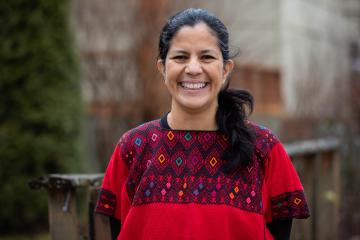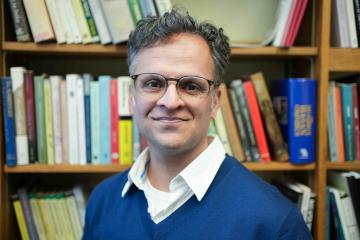
A historian and a linguist have received National Endowment of the Humanities (NEH) awards, a prestigious honor that goes to only 16% of applicants in a given year.
Preserving Diidxaza
Gabriela Pérez Báez, associate professor of linguistics and director of the Language Revitalization Lab in the University of Oregon’s College of Arts and Sciences, received an NEH award to continue her work in the growing field of language revitalization. She is researching Diidxaza, an endangered language spoken in Oaxaca, Mexico, and developing a dictionary for the language which will then be translated into Spanish and English.

Of the twenty-two municipalities in the Isthmus of Tehuantepec where Diidxaza is spoken, only in two municipalities are children growing up as speakers of the language. In some communities, the youngest speakers are in their 30s. In other communities, they are in their 60s. Given the language endangerment situation, there are local efforts underway to reclaim domains of language use for Diidxaza. The dictionary will have some 10,000 entries, making it the most extensive documentation of the language by far. It will be available open source online so that it may serve as a key resource in support of revitalization.
“I have worked for over 20 years on the documentation and revitalization of Diidxaza,” Pérez Báez said. “During this time, I have collaborated with dozens of community members who are concerned about the sustainability of their language. I am eager to make the dictionary accessible to the community broadly to support the long-term prospects of Diidxaza.”
This work is funded through the Dynamic Language Infrastructure-Documenting Endangered Languages fellowships program, which supports research to develop and advance scientific and scholarly knowledge concerning endangered human languages.
Genomic tools may contribute to or exacerbate disparities in health care
Arafaat Valiani, an associate professor in the Department of History and affiliated faculty in the Global Health program at the UO, has received an NEH award to examine the ethical and social-cultural dimensions of how precision medicine is being used to address health disparities experienced by racialized communities.

While very much in its infancy, precision medicine is a form of preventative care that relies on genomic tools to identify gene mutations associated with potential diseases before they are detected. Such detection has the potential to address health disparities experienced by racialized community members, who are more likely to seek treatment at the onset of illness through urgent or acute care. Valiani published recommendations for geneticists and biomedical researchers in late 2023 to encourage greater equity and to encourage research teams to develop meaningful and collaborative partnerships with communities interested in participating in genetic research.
In his proposed study, Valiani will investigate whether the use of genomics will reduce or reproduce the disparities experienced by racialized and Indigenous populations. His study will focus on the discourse about the successes and failures of using preventative medicine to provide care to these groups of people in Canada, a country with sophisticated protections for human subject research of racialized populations.
“Because of this project’s commitment to trace how precision medicine might address or exacerbate health disparities among racialized communities, this multidisciplinary project brings together insights from global health ethics and history of the life sciences in ways that will produce important insights about the role of biotechnology in public health,” Valiani said.
This work is funded by NEH Dangers and Opportunities of Technology program, which supports research that examines technology and its relationship to society through a humanities lens.
